BABOON MATTERS OP-ED
Authorities okay hunting and killing of Cape baboon despite call to Minister Creecy for a moratorium
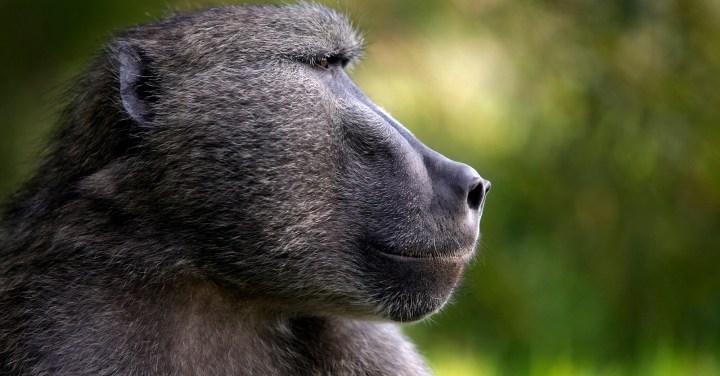
The killing of Julius, of the Plateau troop, illustrates again how the City of Cape Town, SANParks, Table Mountain National Park and CapeNature have failed baboons and management of the baboon-human interface.
On 20 July 2022, Baboon Matters, Beauty Without Cruelty SA, Baboons of the South and the Green Group Simon’s Town co-signed and sent a request for a moratorium on killing baboons on the Cape Peninsula to Minister of Forestry, Fisheries and the Environment Barbara Creecy. This request was copied to the executive decision-makers at the City of Cape Town, SANParks, Table Mountain National Park (TMNP) and CapeNature.
Given that the minister had just called urgent meetings regarding management of the peninsula baboons – where, among other points, she noted that killing individual males upset the social hierarchy of the troops and should not be allowed – why then did these advocacy groups feel the need for the security of a moratorium to protect baboons when all parties appeared to be committed to “sitting around the table together” and working on (yet another) task team?
Apart from the fact that the authorities have not been able to resolve the issues of legal mandates and responsibilities in the past 20 years, and apart from the fact that the lack of willingness among the three main role-players to cooperate and sign off on the most basic of documents such as a strategic management plan for this isolated population of baboons, there is a long history of a lack of transparency from the authorities and corresponding mistrust from civil society.
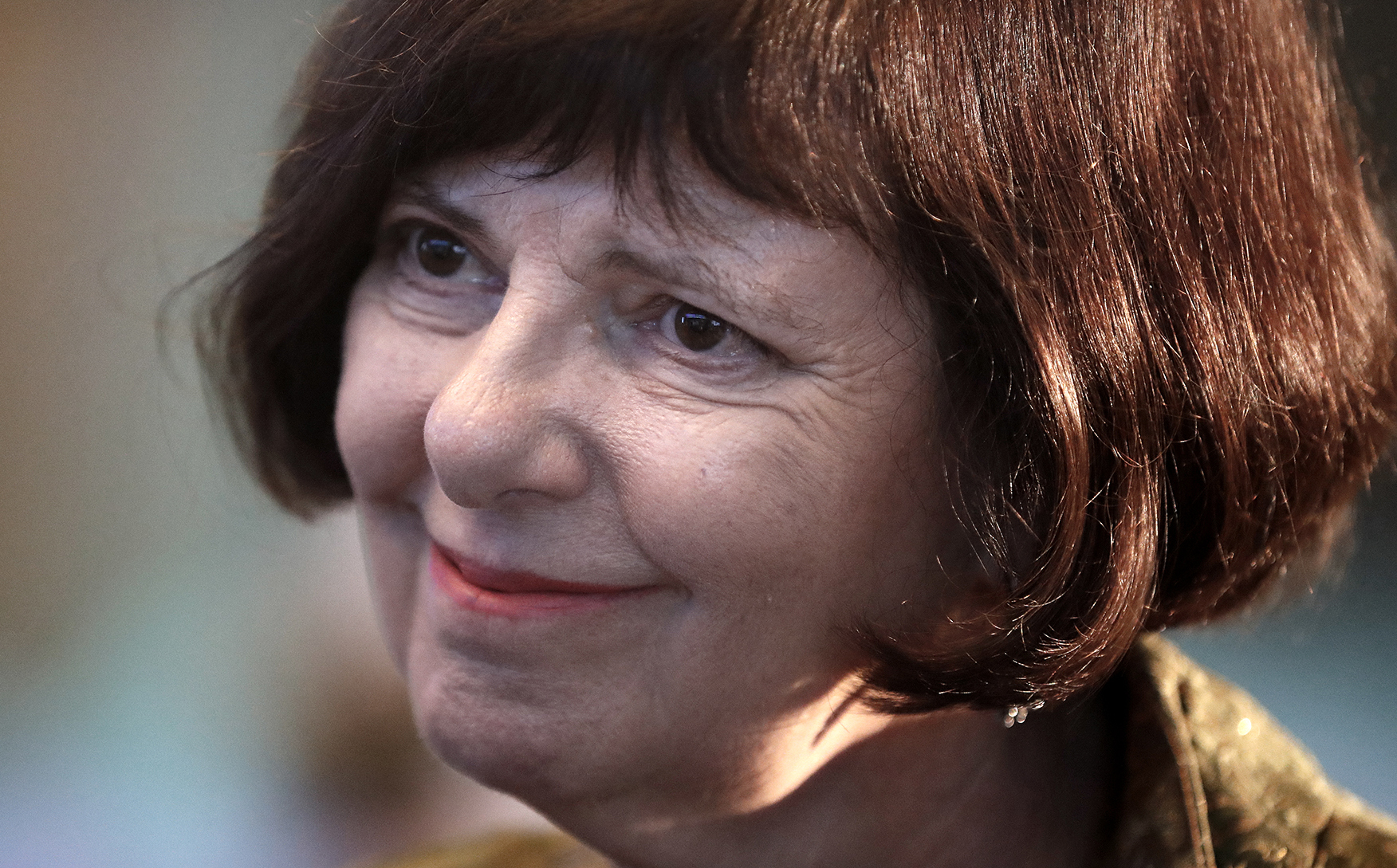
Environment Minister Barbara Creecy. (Photo: EPA-EFE / Nic Bothma)
In just one example of the lack of transparency that has confounded trust issues, Sylon, the well-loved male of the Waterfall troop, was killed the day following a meeting of the CARBS (Councillor Appointed Reps Baboons South) in February 2020; not one word of the intention to kill Sylon was heard during the long meeting.
Knowing that “problem” baboons are all too frequently killed first and public concerns dealt with later, we were apprehensive when just days after the second public discussion on baboon management, instead of fresh thinking and moving towards the “new co-existence model” proposed by the City of Cape Town, the City and CapeNature instead issued a worrisome joint press statement.
Read more in Daily Maverick: “What GPS trackers revealed about Cape Town’s baboon troop movements”
On 15 June 2022, the City and CapeNature called for applications to relocate three male baboons who were noted for “raiding” behaviour and described as “assertive and brazen” (despite numerous requests for the authorities to moderate use of anthropomorphic and sensationalist language).
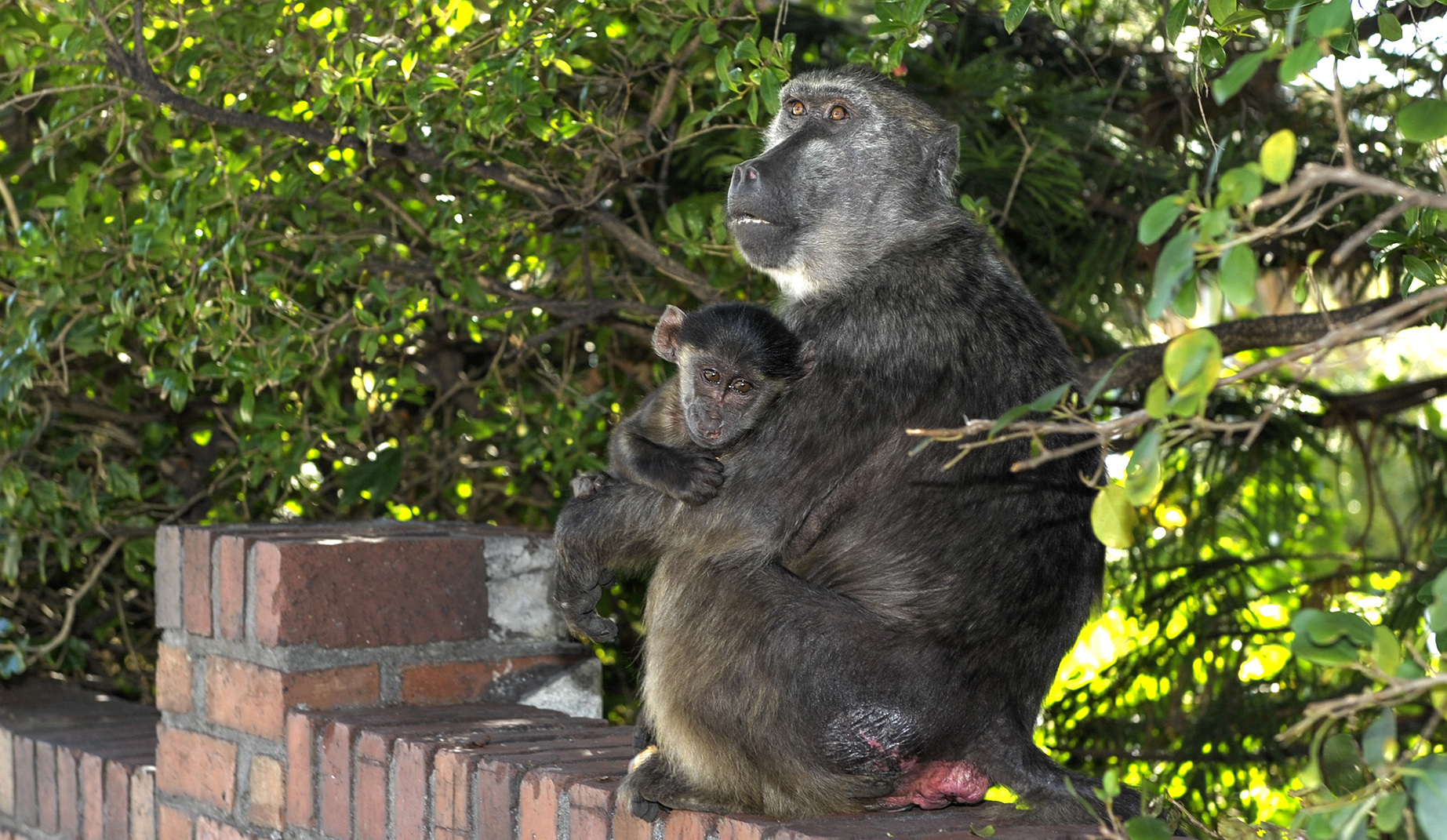
A mother and baby from the Waterfall baboon troop in Simon’s Town. (Photo: Joyrene Kramer)
What the press release really means is that if an NGO or wildlife facility does not step forward and take these male baboons, together with all associated costs, the baboons will be killed in terms of the current protocols (BTTG3).
In addition to the three individual males (Gift of the Kommetjie troop, Van Damme of the Smitswinkel troop and Nomahlehle of the Waterfall troop) we have been informed that the authorities are considering “reducing the numbers” of baboons and that specifically the CT2 troop of Constantia may be one of the “compromise” decisions taken.
Killing is not the answer
After two decades of lethal management decisions, during which nearly 80 baboons have been killed in terms of the protocols, with no obvious improvement to management as a result of their deaths, we are adamant that killing baboons does not solve the issue of baboons coming into urban areas for easy food rewards, and in many cases the removal of dominant baboons (male and female) exacerbates problems by causing havoc with troop structures.
Read more in Daily Maverick: “It’s too late for the ‘can’t interfere with nature’ argument – suffering baboons need our help and compassion”
Given the fact that the partners (City of Cape Town, CapeNature, TMNP and SANParks) are reportedly resolving the long-outstanding issue of mandates and are supposedly working collaboratively, then a moratorium on killing baboons while they sort themselves out should not be considered an unreasonable request.
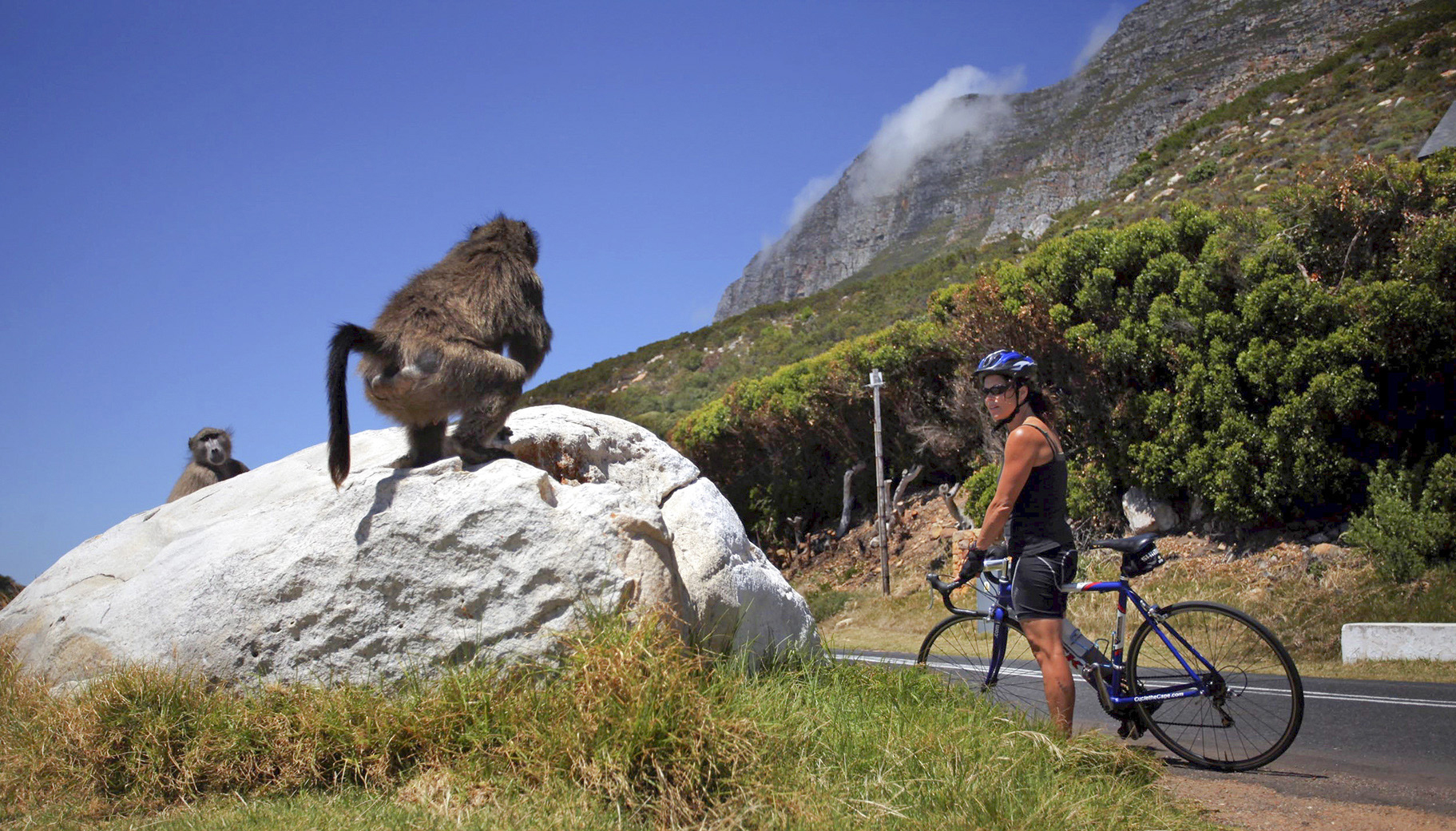
A cyclist watches baboons close to Cape Point. (Photo: Gallo Images /Sunday Times / Marianne Schwankhart)
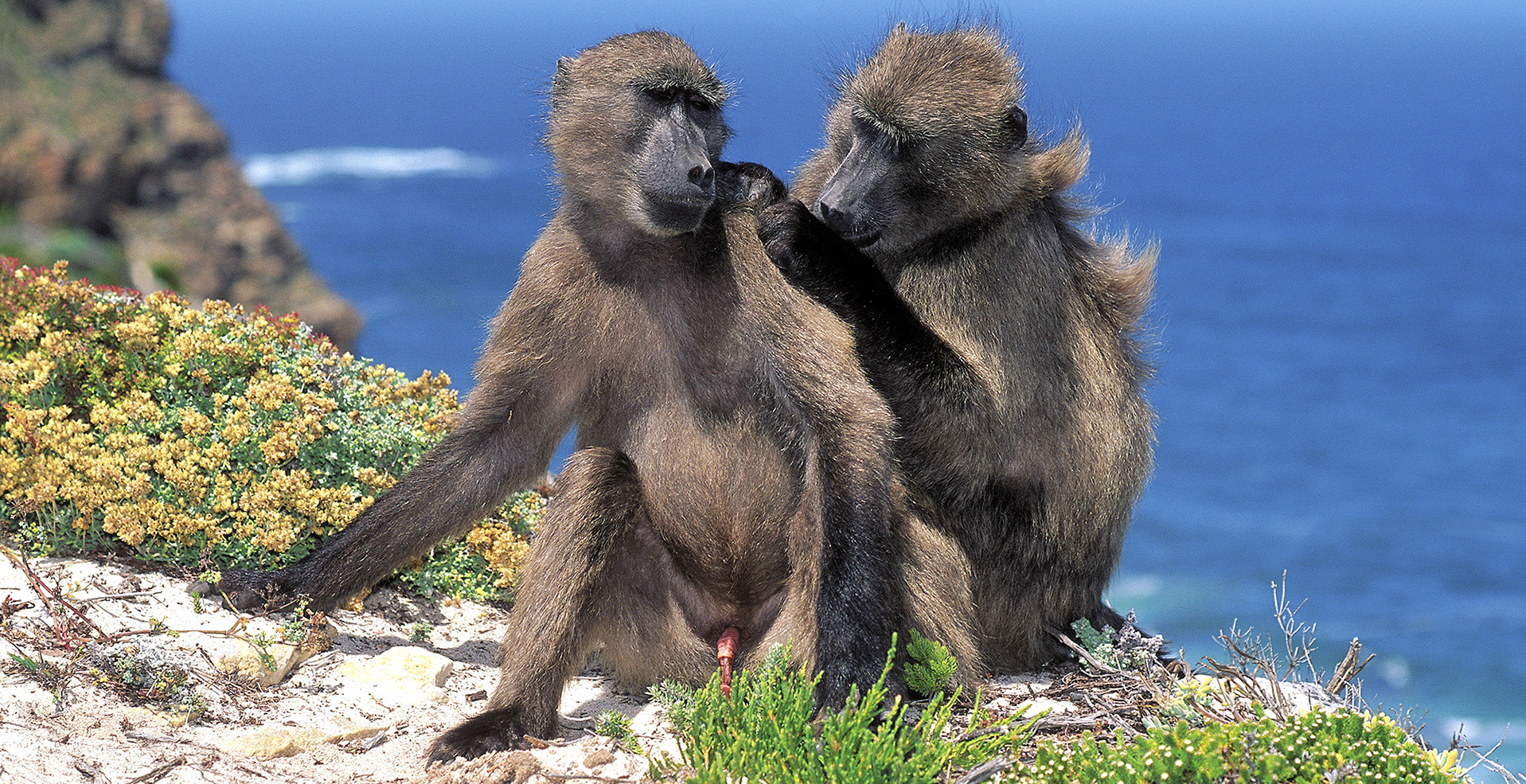
A baboon picks fleas off of his mate at the Cape Point Nature Reserve in Cape Town. (Photo: Gallo Images / Mark Skinner)
It seems that we are wrong again, although we have not received any official response to the request for a moratorium, but we could be forgiven for thinking that CapeNature had sent a very clear message when we received word that Julius of Plateau Road had been killed just days after our request for a moratorium.
The fact that CapeNature issued a hunting permit to kill a baboon at this tenuous time raises a number of important issues, not least of which is: how can the partners ever get to a point of working collaboratively when they act so independently of each other, and often with detrimental impacts? CapeNature did not have to liaise with the City when reaching the decision allowing Julius to be hunted, but their decision certainly has direct impact on the City who have been calling for positive inputs and solutions for baboon management and are now having to deal with very angry residents. Issuing a hunting permit meant that Julius was shot.
If the partners cannot even agree to a moratorium which would give residents, activists, advocacy groups and animal welfare organisations faith that baboons won’t be killed while they debate their long-term roles and responsibilities, how will they agree on long-term plans?
The City admitted at the public meeting on 7 June 2022 that they had not done as well as they could have when it comes to managing the baboon-human interface; a huge understatement when one considers there are no baboon-proof bins, no by-laws and few of the deliverables that were promised in the Urban Baboon Programme.
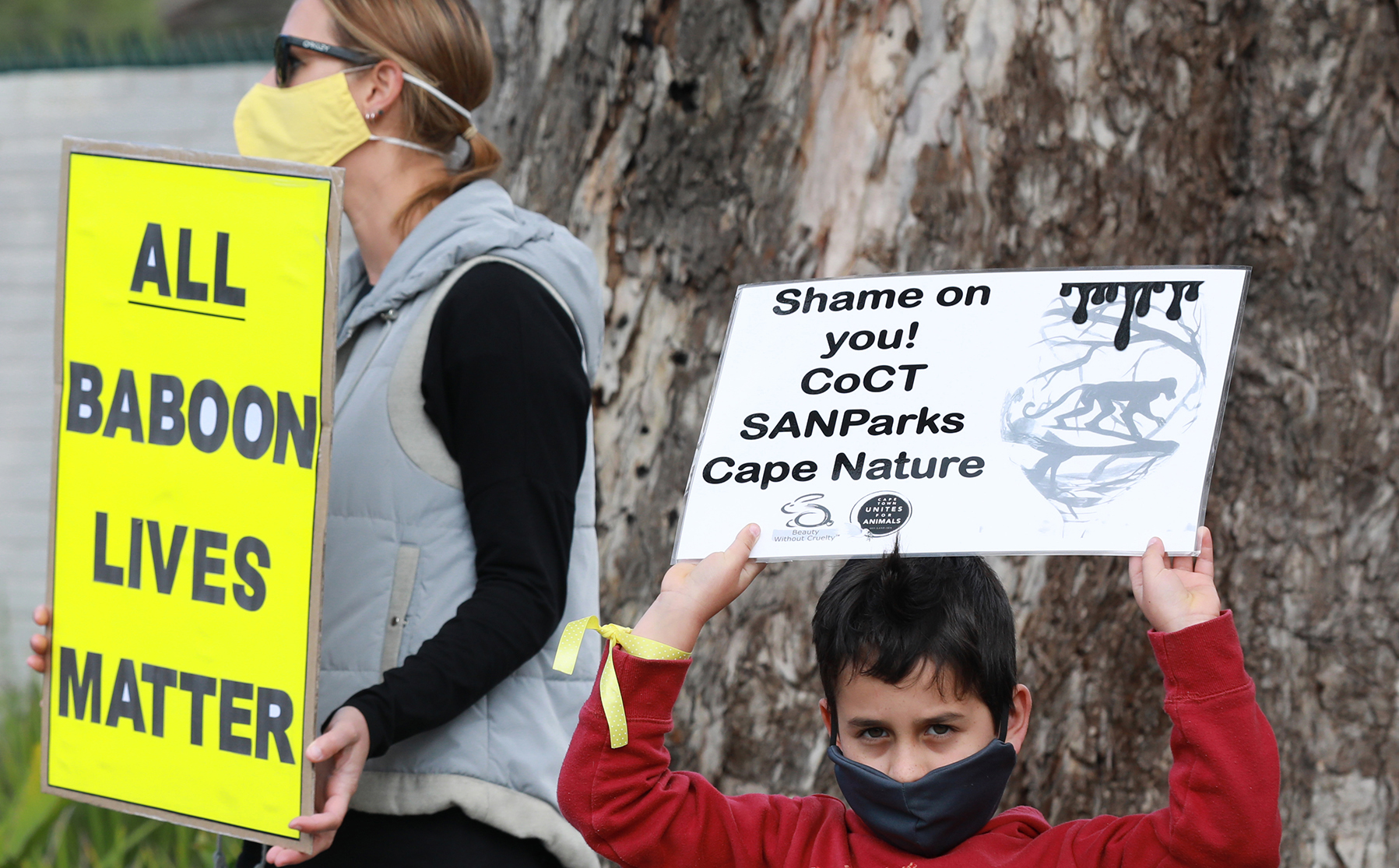
People take part in the #BringKatazaBack protest in Tokai, Cape Town on 27 September 2020. Kataza had been relocated from the Slangkop troop in Kommetjie to Tokai after City authorities claimed he was responsible for leading other baboons in his troop on raids in Kommetjie. (Photo: Gallo Images / Nardus Engelbrecht)
But it is not only the City who have failed baboons and management of the baboon-human interface; at the 7 June meeting it was openly admitted and discussed that the role-players had “walked away from the table”, leaving no one to deal with growing concerns.
It seems that only CapeNature have actively adhered to their role in management of baboons, doing so by continuously issuing permits for “problem baboons” to be killed. By opting for killing individual animals rather than holding the City, TMNP and the South African Navy accountable for mitigation and land management, all four parties are equally guilty of such dereliction of their duties that baboons have become habituated to food rewards found in human-occupied spaces – and humans occupy a great deal of space in the natural environment and in increasing urban sprawl.
Read more from Our Burning Planet:
Monkey Business (Part Two): Who is responsible for the management of baboons on the Cape Peninsula?
There is almost no place on the Cape Peninsula where you don’t find people, or garbage left by people, and baboons now know exactly where to find those easy pickings. But killing them won’t change anything… not unless we kill every last baboon and live a life without these fascinating, vexing primate neighbours.
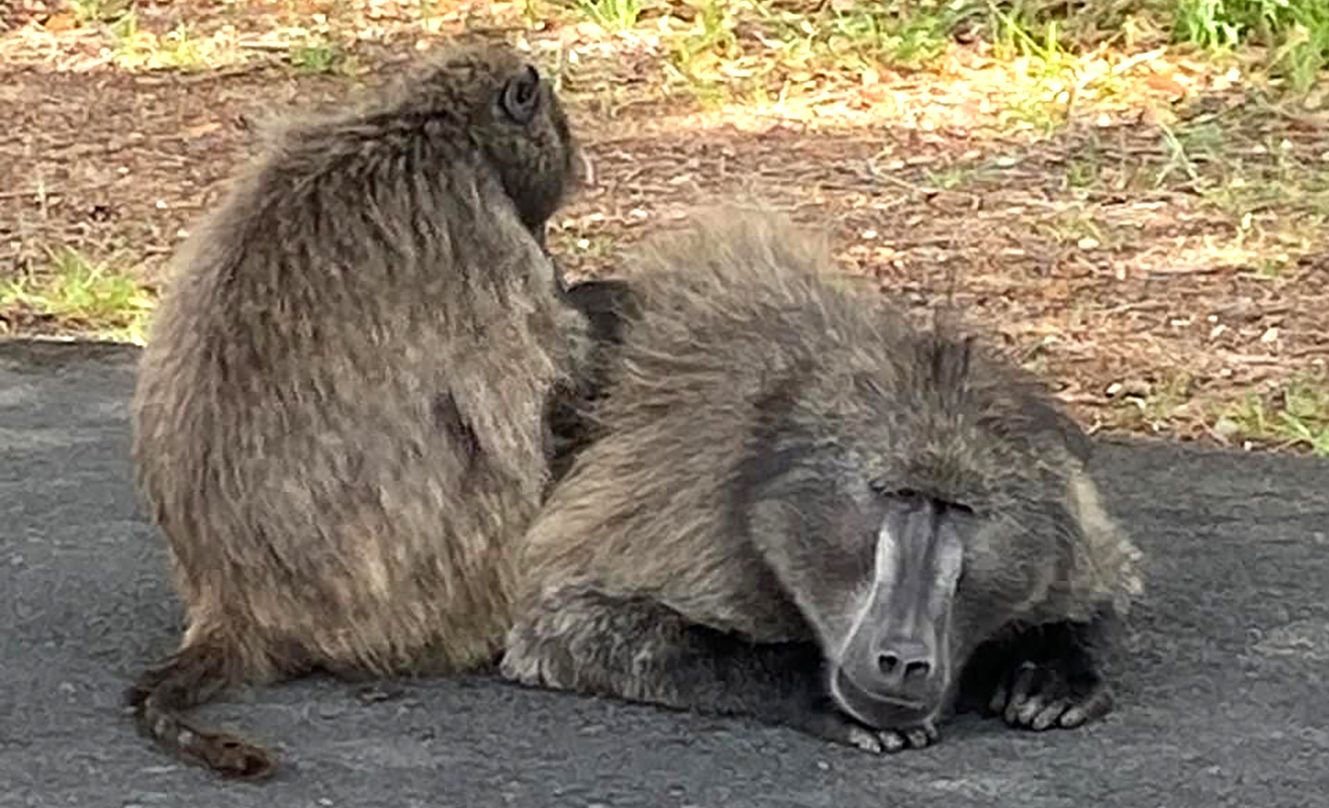
Julius of the Plateau Road troop. He was shot and killed after Cape Nature released a hunting permit. (Photo: Supplied)
At a recent meeting, Baboon Matters was asked directly what our stance would be on culling the CT2 troop specifically. Our answer is clear: we do not support lethal management of baboons and the lives of baboons are not the compromise we are prepared to debate.
There is much to be done to resolve better management of the baboon-human interface and it starts with the role-players playing their roles with diligence, commitment and empathy. The apathy of the past has created this mess and only dedicated effort will resolve it. Baboon Matters and many thousands of citizens will fight for every baboon and to ensure acceptable management plans and methods. DM/MC
Jenni Trethowan has championed the rights of baboons in Cape Town for 25 years. In 1990, following the culling of a troop of baboons in Kommetjie, she, with Wally Petersen, formed the Kommetjie Environmental Awareness Group (KEAG) which successfully lobbied for the protected status of baboons on the Cape Peninsula. In 2001 she left KEAG to start Baboon Matters, focusing on creating awareness for the plight of baboons living on the urban edge. She has since featured in more than 40 documentaries, received numerous awards, published a book and been personally commended on her work by Dr Jane Goodall.






















 Become an Insider
Become an Insider
Dear Jenni. Thank you for your article bringing us a bit of the extent of the baboon problem. Are you suggesting that the solution is to retrain all people who live in or go to the areas where the baboons are? Please write and article putting forward your solutions. I would prefer to be left thinking about a variety of solutions that just negatively about some current ones. Thank you.
Ignorance always leads one down the path of least resistance. This I learned from the wonderful late Lawrence Anthony, SA’s own elephant whisperer. He told me this back in the late ’90’s, when he was battling the SANParks and local farmers in their helicopter gun ships trying to save his adopted so-called “rogue” elephant herd from their eager guns. His rescue of the herd, understanding of elephant herd dynamics and building trust with the successive matriarchs and bulls is a signal lesson we can all learn from in managing wildlife / human interaction. Baboons on the peninsula have become habituated to human areas because we have allowed it. A couple of slices of white bread is the equivalent of about 6 hours of foraging to a baboon – you figure what choice they will make if the bread is available. The reversal of this is simple, but will take a long time. Firstly, stop residents and tourists from actively feeding baboons. Spot fines need to be enforced, not just sit on the statute books. Secondly, introduce baboon-proof rubbish bins, and force residents to use baboon proof bins for their refuse collections. Rubbish is a major source of foraging for baboons. Thirdly, encourage residents to secure their homes against baboon ingress. In the longer term, with easy food sources cut off from them, the baboons will give up on human areas. But if you kill them, you will simply lift the levels of aggression on both sides. Keep up the good work Jenni.
Jenni
What you call for, and your advocacy for baboons is one of a deeper and higher understanding that needs to be a shared value.
Studies have told us that more baboons will take the place of those shot, and the arguments will occur in unending waves, until the last baboon is gone. Reminds me of the the Joni Mitchell song – “you don’t know what you’ve got til it’s gone”
I wish there could be a concerted effort from every person to stop feeding them. But what I see in Knysna is refusal to do that one thing as a group. Unbelievable.
It can be done. We live in harmony with our baboon troops at Noetzie. It is simple. No dog food out, keeping food out of sight so there is no window shopping, managing bins adequately, and ensuring that pets do not chase them, enclosing vegetables and compost firmly. We learned that after about ten negative food attempts, they push off to more successful areas. Our community pulls together to protect the wildness of these baboons. All it takes is understanding and will.
Unfortunately, as long as the people fail to understand their space in the world due to apathy, lower sentience with the earth or miseducation the baboons will outwit and out play us, and those very same people will turn on them with the only thing they know how to use in the desperate situation they find themselves in – guns.
What is the solution? Killing baboons is not what anyone wants to do. But when homeowners are having their homes raided, their pets attacked and their property damaged a solution is needed. It is no good saying we have invaded their territory and we must just live with it. It may be true, but the city has allowed people to build homes bordering the mountain. Some people have houses for decades next to Cecilia Forest with no baboon issues until recently.
The baboon numbers have grown above what the environment can support. Baboons are hugely destructive and can cause hundreds of thousands of rands of damage. People suffering this kind of damage are going to eventually want the baboons removed.
I have not seen the groups supporting baboons give actual solutions (beyond baboon proof bins and living inside your house like a prison). They ask for discussion, but I would really like to know what the solution is.
To my mind contraception should be a key in keeping numbers down. There should be huge fines for littering and providing food sources for baboons. And the monitors should be kept on to help keep the baboons on the mountain.
This is going to be a difficult one. According to Natural Habitat Adventures baboons’ primary predators are not only humans but also leopards, striped hyenas, crocodiles, lions and cheetahs.
I grew up on the Cape Peninsula and, as a boy, roamed the mountainsides above Hout Bay (we lived on Tierbos for several years; 1957 to 1960). The property was owned by my grandfather, Dr S H Skaife. I remember tracking and observing the baboon troop that lived in the mountains between Constantia Neck and the Fish Hoek valley. Back then, there were just three baboon troops on the Peninsula – one on Table Mountain, one in the Hout Bay Mountains, and the one that roamed from Fish Hoek to Cape Point. I have asked why the baboon population on the Peninsula has expanded so much since the early 1960s but have yet to find an answer. Back then, there was human-baboon conflict at the Cape Point parking lot but that was pretty much the only conflict point.
Human-wildlife conflict can be a “wicked” problem. Certainly, that appears the case with the Cape Peninsula baboons. The lack of trust between the various positions is going to be difficult to resolve but the polarization must be addressed. For example, some form of baboon fertility control may offer a way to break the current impasse but it is not clear who might be trusted to even suggest such an option. But, if anybody is interested, more information on such approaches can be found on the Botstiber Institute (a US NGO focused on wildlife fertility control) website.
Sincerely
Andrew Rowan
Andrew Rowan, DPhil
WellBeing International
Potomac, MD USA.
What a sad state of affairs, no different when politicians are duped into believing the barrel of a rifle is the only answer. It seems COCT’s so called ‘leaders’ are no different. It’s just too difficult to think about, so ignore the issue. So when the time comes to vote at elections I may suddenly find it too difficult to think about as well. Shame on all the parties that do not listen to the NGO’s that are actively applying their intellect to resolving the challenge.
To balance this very one sided article that really offers no solutions, I suggest reading “Cape Town’s baboon programme: Successful coexistence between wildlife and urban communities” by Justin O’Riain.